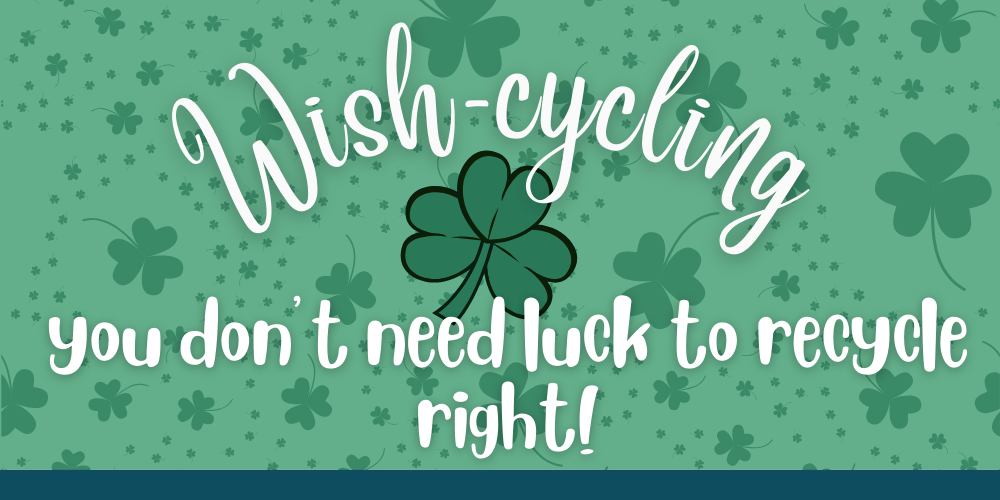“Wish-cycling”

We’ve all been there: We stand in front of a recycling bin with something that we’re not sure is recyclable. With all the best intentions, we toss it in the recycling bin, hoping that with a little bit of luck, this item is recyclable. There’s a name for this: “wish-cycling,” or tossing items into the recycling bin in the hopes that they are recyclable, even when we’re unsure. And although wish-cycling is something we’ve all done with good intention, it can lead to a host of negative impacts on the recycling process. Let’s explore some of the most commonly wish-cycled materials, and why these items don’t belong in your curbside recycling bin!

Plastic Bags: A Tangled Mess
Plastic bags are not accepted in curbside recycling programs because they tend to wind around machinery, causing costly shutdowns and repairs. Eco-Cycle operates the Boulder County Recycling Center, and shutting down machinery to remove plastic bags tangled up in gears happens every day, often multiple times a day, slowing down operations or even causing damage to machinery. For these reasons, keep all types of plastic bags—grocery store checkout bags, bread bags, trash bags, etc.—out of your curbside recycling bin, and please DO NOT bag your recyclables.
Try these ideas:
- To reduce plastic waste in the first place, remember to bring your own reusable bags when shopping! You can also try to find reuse options for some single-use bags, such as using them as trash bag liners or reusing them when grocery shopping. Some plastic bags can be recycled at specialized drop-off facilities, such as the Eco-Cycle Center-for-Hard-to-Recycle Materials (CHaRM).
- Please do not bag your recyclables. If you are using a bag for recycling, please empty your recyclables loose into the recycling bin and reuse the bag.

Paper and Plastic Cups: Coated in Confusion
Whether made of paper or plastic, disposable cups often create confusion when it comes to recycling. Office paper and newspapers are recyclable, so surely that means paper cups are recyclable, too? Plastic bottles are recyclable . . .so that means plastic cups are also recyclable . . . right? Unfortunately, paper cups are coated with a thin layer of plastic or wax to prevent leaks, making them a material the paper markets don’t want to buy from recycling facilities. In most communities, these cups are not recyclable (but check your local guidelines to make sure).
Plastic cups with a #1 or #6 on the bottom—which include red Solo brand cups and clear cups used for cocktails—shatter in the recycling process, and the markets that purchase plastic do not want to buy these materials. For these reasons, these plastic cups are typically not recyclable. The only plastic cups that are more commonly recyclable are #2 and #5 plastic cups typically used as souvenir cups.
Try these ideas:
- The best bet? Reduce single-use plastic waste by bringing your reusable cup, bottle, or mug with you wherever you go! If you’re planning a large event, check out companies providing reusable cups, such as r.World.

Batteries: A Spark of Danger
Batteries, especially the common household types, might seem recyclable at first: Metal cans can go into your curbside recycling bins, so why not “metal” batteries? However, tossing batteries into the recycling bin can ignite huge recycling problems! Batteries are highly flammable and can cause fires in recycling facilities. Batteries should also not be thrown in the trash because they contain toxic chemicals that can leak into groundwater. Always handle batteries as household hazardous waste, and drop them off at specialized battery recycling programs or at your community’s hazardous waste collection facility.
Try this idea:
- Lucky for us, there is an easy, and ultimately less expensive alternative to disposable batteries—rechargeable batteries!
Recycling Right Requires No Luck!
While wish-cycling stems from a desire to do good, remember that recycling isn’t based on luck! Knowing what is and is not recyclable depends on checking your local recycling guidelines. By understanding what can and cannot be recycled curbside, especially when it comes to tricky items like plastic bags, paper and plastic cups, and batteries, we can all contribute to a more efficient and effective recycling system. Let’s not leave the recycling up to chance!



























